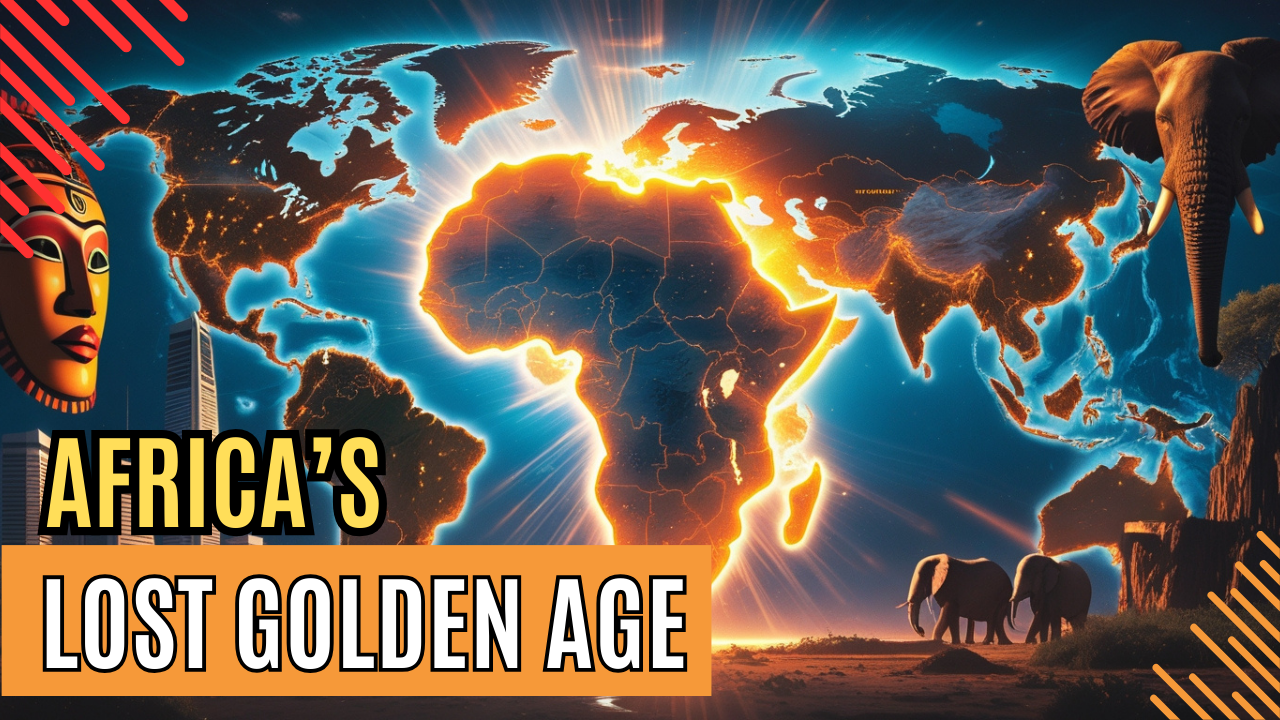Welcome to Uncharted History, where we explore the roads not taken and the worlds that might have been. Today, we’ll delve into a question that has fascinated historians, scholars, and dreamers alike: What if Africa was never colonized?
Imagine a world where the borders of Africa weren’t drawn by foreign powers in distant conference rooms. A world where the continent’s rich cultures, economies, and political systems evolved entirely on their own terms. What would Africa look like today? How would the world be different? And what lessons can we learn from this alternate history, especially as we reflect during Black History Month?
Before we begin, don’t forget to hit that like button if you enjoy these thought experiments, and subscribe to Uncharted History for more deep dives into the fascinating ‘what-ifs’ of our past. Now, let’s embark on this journey together and explore a world where Africa’s destiny was never interrupted by colonization.
Pre-Colonial Africa – A Continent of Wealth and Diversity
To understand what Africa might have looked like without colonization, we first need to appreciate what it was like before European powers arrived. Contrary to the outdated and harmful stereotypes of Africa as a dark continent, pre-colonial Africa was a vibrant tapestry of civilizations, each with its own unique achievements.
Take the Mali Empire, for example. Under the rule of Mansa Musa in the 14th century, it was one of the wealthiest and most powerful empires in the world. Musa’s famous pilgrimage to Mecca, during which he distributed so much gold that it destabilized economies along his route, is just one testament to Mali’s prosperity.
Or consider the Great Zimbabwe, a city of stone walls and towers that stood as a center of trade and culture in southern Africa. The Swahili Coast, with its bustling ports and cosmopolitan cities, connected Africa to the Indian Ocean trade network, exchanging goods, ideas, and cultures with Arabia, India, and beyond.
And let’s not forget Ethiopia, a nation that successfully resisted European colonization for centuries, maintaining its independence and rich cultural heritage. These examples only scratch the surface of Africa’s pre-colonial diversity and sophistication.
So, what if these civilizations had been allowed to continue their development uninterrupted? What innovations might have emerged? What new empires or nations might have risen? These are the questions we’ll explore as we move forward.
Economic Impact – A Continent in Control of Its Resources
One of the most devastating consequences of colonization was the exploitation of Africa’s vast natural resources. From gold and diamonds to rubber and oil, European powers extracted wealth on an unimaginable scale, often leaving little for the people who actually lived on the land.
But in a world where Africa was never colonized, the continent’s economies would have developed very differently. Instead of being shaped by the demands of foreign powers, African nations would have had full control over their resources.
Imagine the Mali Empire, with its legendary gold mines, continuing to dominate global trade. Or the Kongo Kingdom, with its sophisticated political and economic systems, becoming a major player in the Atlantic world. Without the transatlantic slave trade, which devastated African societies and economies, the continent’s population would have grown steadily, fueling further development.
And let’s not forget industrialization. While Europe and North America were industrializing in the 19th century, Africa’s development was stifled by colonization. In an alternate timeline, African nations might have embraced industrialization on their own terms, using their resources to build modern economies that rivaled those of Europe or Asia.
But what would this have meant for the global economy? Would Africa have become the world’s economic powerhouse? And how would the absence of colonial exploitation have reshaped the balance of power in the world? These are questions worth pondering as we continue our journey.
Cultural and Social Development – A Richer Tapestry
Colonization didn’t just disrupt Africa’s economies, it also had a profound impact on its cultures and societies. European powers imposed their languages, religions, and customs, often suppressing or erasing indigenous traditions.
But in a world without colonization, Africa’s cultural landscape would have been vastly different. Thousands of languages, from Swahili to Yoruba and Amharic, would have continued to flourish, each carrying with it a wealth of stories, knowledge and traditions.
Religions like Christianity and Islam might still have spread across the continent, but they would have done so organically, blending with indigenous beliefs rather than replacing them. Imagine the rich spiritual traditions of the Dogon people or the ancient Egyptian religion coexisting with these global faiths, creating a unique tapestry of belief systems.
Art, music, and literature would have also thrived. From the intricate bronze sculptures of Benin to the epic oral traditions of the griots, African creativity would have continued to inspire the world. And without the cultural suppression of colonialism, we might have seen even greater innovations in these fields.
But perhaps the most profound impact would have been on African identity itself. Without the scars of colonization, how would Africans view themselves and their place in the world? And how would the rest of the world view Africa? These are questions that remind us of the deep connections between history, culture, and identity.
Political Landscape – Nations and Empires of Their Own Making
One of the most visible legacies of colonization is the borders of modern Africa, lines drawn by European powers with little regard for the people who lived there. These arbitrary divisions have fueled conflicts and tensions that persist to this day.
But in a world without colonization, Africa’s political landscape would have been shaped by its own people. Instead of being divided into colonies, the continent might have been home to a patchwork of nations, empires, and confederations, each reflecting the unique histories and cultures of its inhabitants.
The Ashanti Empire, for example, might have grown into a powerful West African nation, while the Zulu Kingdom could have dominated southern Africa. In the east, the Swahili city-states might have formed a maritime federation, controlling trade routes across the Indian Ocean.
And how about diplomacy? Without colonization, African nations would have interacted with each other and the world on their own terms. Imagine the alliances, treaties, and cultural exchanges that might have taken place. How would these relationships have shaped global politics? And what role might Africa have played in shaping the modern world order?
These are the kinds of questions that make alternate history so fascinating and so important.
Global Influence – A World Shaped by Africa
Finally, let’s consider the global impact of a non-colonized Africa. The transatlantic slave trade, which forcibly removed millions of Africans from their homes, not only devastated the continent but also shaped the Americas and Europe. Enslaved Africans built the economies of the New World, and their descendants have made immeasurable contributions to culture, science, and politics.
But in a world where Africa was never colonized, the transatlantic slave trade might never have happened or at least not on the same scale. This would have had profound implications for the Americas, where African labor was the backbone of colonial economies. Without enslaved Africans, how would the United States, Brazil, or the Caribbean have developed?
And what about Europe? The wealth extracted from Africa fueled the Industrial Revolution and helped build modern Europe. Without this exploitation, would Europe have risen to global dominance? Or would the world have been more balanced, with Africa, Asia, and the Americas playing equal roles?
These questions remind us that history is interconnected, that the fate of one continent can shape the destiny of the world.
Conclusion
As we wrap up this journey through an alternate Africa, it’s clear that the impact of colonization was profound—not just for Africa, but for the entire world. By imagining a world where Africa was never colonized, we gain a deeper appreciation for the continent’s potential and the resilience of its people.
This Black History Month, let’s reflect on the lessons of this alternate history. Let’s celebrate the rich cultures and achievements of Africa, both past and present. And let’s remember that history isn’t just about what happened, it’s also about what could have been.
If you enjoyed this, don’t forget to check it out on YouTube . Like, comment, and subscribe to Uncharted History for more explorations of the roads not taken. Thanks for watching, and I’ll see you in the next video soon.




Hello my friend! I want to say that this post is awesome, great written and come with approximately all significant infos. I’d like to see extra posts like this.